Judy Alter's Blog, page 8
February 17, 2024
A leftover day
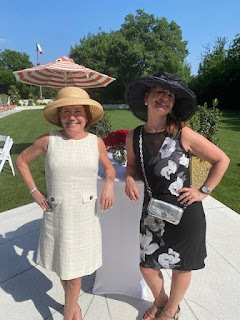 Sue and Jordan
Sue and Jordan
I think that’s a perfect namefor Saturday. After a work week and before Sunday starts a new week, Saturdayis the day left over. I had a busy week and a more active day yesterday than Iam used to, so I promised myself a slow, easy day today. It turned out to be aday of leftovers.
I wrote like a fiend much ofthe week, averaging over a thousand words a day plus, most days, my blog. Thatwasn't drudgery—it was joy. I’m in one of the spells when the words seem to comeeasily and the story flows—and writing is fun. But yesterday, no writing. I wasup early making tuna salad for a lunch guest and a dip for happy hour guests. Atnoon, my long time (50 years?) friend Linda arrived. She had the good mannersto rave about my tuna, and we caught up with families, the few old friends westill know about, life as elders, and touched on the world situation. Her(relatively new) husband had an appointment elsewhere but popped in. and theyboth left shortly after two, because Linda insisted I need my daily nap. And Ido. Sophie and I are always overjoyed to have Linda in the cottage.
In the evening, Subie, Phil, andRenee came for happy hour. The discussion was wide-ranging but got particularlyspirited when we talked about wolves and their effect on the ecosystem andabout the city of Greenville (see below). It was all fun, and we were temptedto stay where we were, but a little before seven we left for a farewell partyfor Teddy and Sue. I’ve explained this relationship several times, but fifteenor more years ago Sue moved into the house next door to me. I can still see herdad walking down the driveway when I asked him, “Are you my new neighbor?” andhe replied, in a wonderful Canadian accent familiar to this daughter of aCanadian, “I’m your new neighbor’s father.” Sue, newly divorced, moved in withtwo young children, and her parents went home to Ottawa, Ontario. In time, Suedeclared she needed a Fort Worth mother, since hers was so far away. I washonored and consider her my Canadian daughter. Along the way, she bought ahouse ten minutes away and married Teddy (one of my favorite people in theworld). Now they are moving to Greenville, South Carolina—because they fell inlove with the area. My parents retired to a small North Carolina town nearby,and I can easily understand the pull of the region. I’m excited for them butwill miss them.
The party was fun, and I evenknew a few people. But there were two stairs to get in, and we had to recruit afriend from the party to help me. That sort of got me off on the wrong foot,and it was hard to get my party face on. Still I knew a few people and enjoyedvisiting. The setting was a gorgeous house, and I was particularly impressed bythe hostess’ daughter who acted as the party angel. Teddy, bless him, helped meout and saw me safely into the car.
So that’s why today is myleftover day. I confess I am still wearing the flannel pants and T-shirt I sleptin, and I think I’ll just fall into bed tonight, still wearing them. My worktoday was leftovers—my neighborhood newsletter, some bills and some insurancematter, more worry about the trees. Kept me busy all morning.
Even my meals are leftover:tuna salad from yesterday for lunch; a bowl of split pea soup brought to mesome time ago by a friend. It’s been waiting for me in the freezer for anothercold night, and tonight is perfect (at 6:30 it is 41 and headed down). TheBurtons are going to Plank, the new seafood restaurant I really want to try. Ithreatened them if either one came home and told me they had a steak ora hamburger in a seafood house.
Tomorrow won’t be as easy. I’llgo to church in the morning, and I’ve promised to make Norwegian hamburgers forSunday dinner. Norwegian hamburgers are something we learned about from Colin’smother-in-law, who lived in Norway until she was seventeen and came to the USto marry Lisa’s father. The hamburgers are meat patties in beef gravy, but don’tdismiss them as like our hamburgers. Different texture, different flavor anddelicious. We love Torhild, and we love her cooking. I hope I can do them aswell as she does, and I hope there are leftovers.
How about you? How was your SaturdayStay safe and warm on this chilly night.
February 16, 2024
Thoughts on tiny houses
 The living room in my cozy cottage.
The living room in my cozy cottage.
Because I live in what shouldbe described as a “spacious tiny house,” I’m curious about other tiny housesand spend way too much time looking at them online. My tiny house—I call it “thecottage”—is approximately 600 square feet, which really is spacious compared tosome. I have a postage-stamp kitchen, a bedroom that was once a parking bay fora 1920s car (skinny—there’s only one way my standard double bed will fit, in acorner, and a king or queen would never fit), a walk-in closet bigger than anyI’ve ever had (it was a tool shed in a previous existence), and a good-sizedliving area/office (I can seat seven in a pinch). Truly, it’s all the space Ineed. When I lived in the house where Jordan, Christian and Jacob are now, Iwas aware I only used the kitchen, bedroom, and my office.
My tiny kitchen deservesmention, because if I were wealthy and thought I’d be healthy and cooking foranother twenty years (unlikely) I would have a professional kitchen designercome in and tailor it for maximum use of the space and ease in cooking from aseated walker. Due to zoning restrictions, I can only have appliances that Ican plug in. Hence I have a large refrigerator, but no stove or dishwasher. Icook on an induction hot plate and a toaster oven, which means things like thatleg of lamb I crave are impossible. You know all those skillet recipes thatstart on the stovetop and finish in the oven? I have to pass right by thosetoo.
In my online prowlings, I’mnot so interested in school bus conversions, though I admire the ingenuity, andI’m not at all interested in the process. I don’t need to see one more pictureof the interior of the shell of a school bus. No, I’m more interested in thosefree-standing tiny houses. But I have several reservations, and the main one speaksto who I am and what I do for a living: most of those houses have no desk!Where do people sit to work at their computer, pay their bills, correspond withfriends, keep a calendar. Never one to read in bed (hurts my neck) or take mycomputer to the couch (I lose concentration easily), I have made my desk thecenter of my world. I spend far more than the recommended hours seated here,and I almost always eat lunch at my desk. At dinner, we in effect have assignedseating—me at my desk, Jordan at the coffee table in the barrel chair to myleft, Christian in the wing chair on the right of the table, and when he joinsus, Jacob on the couch. My desk is also nicely situated so that I have a large windowon my right and French doors straight ahead—on nice days I can almost bring theoutdoors right inside.
I have other concerns about alot of tiny houses: privacy almost goes without saying. The open sleeping isfine for one person or a couple but the loss of privacy for an intimate lifemust be a problem if there are children or guests. And that aside, loss ofprivacy, of some spot that is yours and yours alone, must be a psychologicalproblem for many. Of course, living alone, it’s no problem. I find that daily Iappreciate my privacy and, once out of the cottage, am almost always ready toreturn.
Two-story or story-and-a-halfconstruction is a great idea for a tiny house, adding a lot of space. But thatsmall space rarely leaves room for anything like a conventional staircase. Asone whose whole life has been marked by a fear of heights and general badbalance, I could never do nine out of ten of those staircases, ladders, etc. Irequire low steps and banisters on both sides. And the open sleeping lofts? I’dbeen afraid of rolling out of bed and tumbling down into the main living area. Night-timetrips to the loo would be complicated by a staircase!
When I first moved into thecottage, Jacob was about ten. I lectured long and hard about the necessity forneatness in a small space. Now, Jacob has moved on to a full social life withhis buddies, and I rarely see him in the cottage, so I can’t blame him for theclutter. The fault is solely mine, but I am no Marie Kondo. My walls arecovered with art, my tables and one big marble buffet with mementos and familypictures. Sometimes my cottage makes me think of the late nineteenth-centurycraze for miniatures. One of my sons says my cottage looks well lived in—Iwould change that to well loved. But that’s another thing that strikes me abouttiny houses—they are usually uncluttered, at least the ones se see online.Perhaps they are dressed up for a photo shoot, but they often look impersonal withsparse decorations—maybe a plant or a picture here or there, but that’s it.(That is not true for bus conversions.)
So here I am, in my semi-tiny, cluttered cottage and ever so grateful to be here. How about you? Could youlive in 600 square feet?
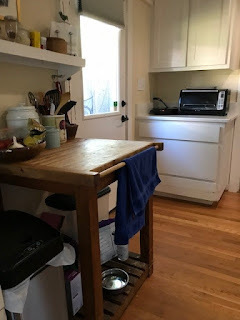 Part of my tiny kitchen.
Part of my tiny kitchen.I frequently feed full meals to four of us
out of this kitchen.
February 14, 2024
Tree hugging on Valentine’s Day
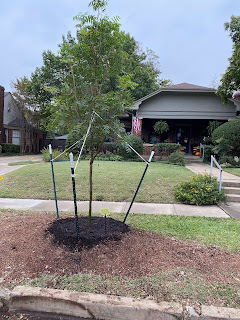 Chinese pistache when new.
Chinese pistache when new.
In the background to the left, you can see
the large trees that line the driveweay
Ithink that I shall never see
a poemlovely as a tree.
“Trees,”by Joyce Kilmer
I admit it—I’m a tree hugger.But when you buy an older house, as I did thirty years ago, you don’t (or Ididn’t) take the trees into consideration. Our house had a huge, old elm at thecurbside by the driveway, a beautiful graceful tree that served as a signpostfor telling visitors where we lived. I always had the fanciful notion that thetree anchored the house to the property; without it, the house might float awayinto space. I could not imagine losing that tree.
But the house was a hundredyears old two years ago, so the tree probably was the same age. It had begunalmost twenty years ago to drop an occasional limb. Once I came home late atnight from a trip only to find the entire front yard covered by a huge fallenbranch. Another time, it dropped a long skinny branch that had been danglingright alongside the curb. Christian worried about parking his car beneath it,though he loved the shade. We all worried about a branch falling on aschoolchild—the house is across the street from Lily B. Clayton ElementarySchool and watching children come and go is one of our extra delights.
There came the day that thecity tree crew informed me the tree was rotten inside and hollow. Because it wasin the boulevard between street and sidewalk, it is legally the city’s tree,and they said it had to come down. Jordan took pictures of the demolition, butI hid in my cottage not wanting to watch. With Christian’s help, we replaced itwith a Chinese pistache—it’s a pretty tree, doing pretty well now and supposedto have brilliant colors in the fall (taking into account this is Texas and wedon’t get a lot of fall color). The pistache will never be as tall and majesticas the late elm, but it is a tree, and I am grateful.
The house boasts two remaininglarge trees on the edge of the driveway, equally as tall as the elm we lost.They are sort of squeezed between the house and the driveway—perhaps, when planted,no one expect them to grow so big or the house to last so long. But they are aproblem—they have pushed the driveway concrete up until only the hardiest ofsouls will attempt my driveway, and that’s a problem because people drive allthe way back to the cottage to pick me up. For several years now, I haveworried about what to do with these trees. They shade the house from summerheat, and I know that we need more trees to fight pollution—we surely don’tneed to be cutting them down thoughtlessly.
When we had all the treestrimmed last month, I asked the arborist, and he recommended jackhammering upthe concrete and replacing it with decomposed granite. I happen to have a goodfriend who is a mason, and he said he and his crew could get rid of the brokenconcrete, but he wanted to meet with the lawn guy about the granite. We metyesterday, and ideas went back and forth, with John, my trusted yard guy,recommending tearing up the old concrete and laying new. That didn’t soundright to me, but they assured me the trees would be fine. And so we left it.
This morning I called thearborist, and he said no concrete. A porous material so the roots can breathe,which makes a lot more sense to a tree hugger like me. So we still haven’tworked it out completely, but what I thought would be a simple thing has turnedout to be complicated. And it’s once again on hold until I get everyone on the samepage. I think Mark, the mason, is more comfortable with my return to my originalplan; Jordan is not, because she’s looking at the convenience of using thedriveway and appearance. I’m looking at saving the trees. The appearance of thedriveway is second to me. The permanence of concrete is part of my hesitation.I figure if the granite doesn’t work out, we can go to Plan B. John seemed tosay the granite might be all right for ten years. I reminded him I am eighty-five!
Stay tuned for updates, but myfinal word is that older houses always bring new problems. That said, I wouldn’twant to live anywhere else.
Happy Valentines Day! As Iwrite, I am waiting for the Burtons to come out. I understand we’re havingsteak and salad for dinner, having abandoned the idea of smashed potatoes toaccompany. I’ve made a new Caesar dressing, which is a bastardization and I’mnot sure about it, but I have house-made croutons and mini-ice cream cones fordessert.
February 13, 2024
Some days I’m up, some days I’m down

That familiar spiritual pretty muchdefines my political barometer. Some days I think reason and common sense andhuman decency are taking over the political scene in our country. This is notone of those days. I’ve read in several reliable sources the opinion that trumphas now solidified his total control of the Republican Party, especially withthe firing of Ronna McDaniel and replacing her with a prominent electiondenier, one of trump’s top aides, and—wait for it—trump’s daughter-in-law, thatseasoned political pro who has never done anything. Great lineup there, trump. Butwhy is he allowed to dictate who leads the Republican Party? Granted, he is themost recent Republican president and the obvious forerunner for the nominationfor the presidency in the coming election. But neither of those standings givehim official power, and yet he exercises power as though he were the leader.
The trouble is that almost allRepublicans have bowed down, given in, and made him their absolute leader. Mostof them know better, and best I hear is that they grumble among themselves butthen end with that classic useless line, “It is what it is.” In his daily WakeUp to Politics newsletter, which I sometimes admire, sometimes think leans tooheavily toward trump for the bipartisanship it professes, Gabe Fleisher saysthat trump is now getting from the party a kind of rote support, a ho-humacceptance by the party of the way things are. It is, Fleisher writes, sort oflike getting in line at the grocery store. Two images come to mind: one is thewomen of The Handmaiden’s Tale (or the Stepford Wives—take your pick)and the other is of a school of lemmings. Quoting from an anonymous web site, a person called a lemming is one “whofollows the will of others, especially in a mass movement, and heads straightinto a situation or circumstance that is dangerous, stupid, or destructive: These lemmings that eat up conspiracy theories are soblinded by lies, they don't even see the cliff they're about to plummet over.”
It's dawned on me what the nature of that cliffis: Isolationism. Trump boasted about ignoring NATO and encouraging Putin toattack “whoever the hell he wants.” Increasingly, what is apparent is thethread of isolationism that underlies all trump’s vague, threatening, wildstatements on foreign policy. I doubt the trump would benefit much from a studyof history, but it makes one wish that the Republican legislators who are nowfollowing his every word had learned their history lessons, particularlyAmerican history.
IN the sense that America should use its powerand strength to encourage democracy and freedom in other nations by negotiationrather than warfare, I’m all for isolationism. But that’s not what trump means.His isolationism removes our country from any involvement in the affairs ofother countries, be they European, Asian, or African. As far back as WWI,President Woodrow Wilson made the case for America’s involvement in maintaininga peaceful world order. WWII and Pearl Harbor cementer that we cannot remainaloof from worldwide conflicts.
How in heaven’s name does anyone of sane mindthink in this day of instant communication, intercontinental drones, andinstant nuclear weapons that we can afford anything but world peace? The world’ssecurity assures our security. If Russia conquers Ukraine (Tucker Carlson aside),it will walk all over Europe, and we will have a much more formidable enemy whowill eventually come to our shores. Wesimply cannot afford isolationism today. President Biden has done a magnificentjob of restoring our international relationships and securing our place as aworld power active in promoting peace throughout the world. Trump would tearall that down.
Trump’s isolationism is particularly ironiccoming from a man who had all his election materials made in China, along withwho know what else, and whose daughter is actively engaged in widespread businesswith China. Such irony is lost on the lemmings in the House of Representatives.
Other depressing things today: on their secondtry, the MAGAs managed to impeach Alejandro Majorkas, a good and honest man whoas Secretary of Homeland Security has the world’s most difficult andunrewarding job. Republicans decided to make an issue of the border, and thelemmings just did it in spades. It won’t pass the Senate, but it will foreverbe a blot on the record of a man who did his best in an impossible situation.All the House could come up with was “a breach of public trust,” the vaguest ofcharges.
And in their eternal quest to find somethinganything against the Biden administration, the House will now subpoena DOJrecords in an investigation of Biden’s age. Good gravy! We all know how old heis, we all know he’s in better shape than trump, including cognitively, but theywill make a big deal out of a horrifically biased report.
I’m hoping tomorrow will be a better day forthe good guys.
February 11, 2024
Superbowl and thoughts on sleep

No,the two aren’t really connected, though I do find the Superbowl broadcastoverwhelmingly noisy which tends to make me want to retreat to my bed. I am nota football fan, and it is immaterial to me which team wins—except this year Iwant the Chiefs to win simply because I’ve heard too much hype about Taylor andTravis and I want them to enjoy their moment. I think what they have right nowis true love, the kind that lifts you off your feet and takes you to a newstratosphere. Some people never know that in their whole lives, so I‘mdelighted for Travis and Taylor, Whether it lasts or not, let them have it now.
Butthe fact that much of the Superbowl makes me want to retreat to my bed reminds methat I’ve been thinking about sleep patterns and age lately. You know thoseobnoxious people who spring out of bed at six in the morning, alert, bright,and ready to take on the day? I used to be one of them. I always said I did mybest work, writing, whatever in the morning. Not anymore.
Andyou know how teenagers can sleep until noon? I never could do that. My internalclock woke me at seven, and If I stayed in bed, I got a headache, tossed andturned, and found it easier to get up rather than pretend I was sleeping late.Not anymore.
My internalclock has shifted. It happened gradually, but these days I find myself up andworking at my computer until midnight. And I can happily sleep until nine inthe morning—once in a while, nine-thirty, though I haven’t made it to noon yet.Sophie gets me up at seven or seven-thirty for her breakfast, but I can go backto bed and go sound asleep until she wakes me again for her second breakfast (thetwo-step breakfast is another subject and has to do with her diabetes).
Thenthere are naps. I have always been a napper, grew up in a family where everyonenapped, made my children nap until they were way beyond the point where mostkids take naps. I would tell them to take a “body rest” if they didn’t sleep.But like most responsible adults, I had a nine-to-five job and couldn’t napduring the week. On the weekends, it was an indulgence. But now that I’mretired, it has become a necessity. I get unbearably sleepy about after lunch,and I’m good for a nap of anywhere from one to two hours. Some days I sleepdeeply, with wild dreams (I’m one of those who often remember dreams, at leastfor a while); other timrd I think I’m not sleeping but realize when I get upthat I’ve been off somewhere else. More frequently these days, waking up toreality is difficult—I’m grumpy. Yesterday I’d had a good and productivemorning but woke from my nap with the feeling that I was sick somehow. I wasn’t.It just took me a while to get back to myself. That’s a new thing too. Pleasenote: don’t call me between about one-thirty and four-thirty. Give me a bit offlexibility
Andthen there are what a friend calls pajama days—those days when all you want todo is go back to bed. They don’t happen often, but when they do, I give in tothem. I may nap off and on all day. It seems to be what my body needs. I’m notsick, not sad, not depressed—just sleepy. I never think I can plead I’m tiredor overworked because mine is not a demanding daily schedule.
TheNational Institute on Aging says the elderly (isn’t it strange to apply thatterm to yourself?) need the same amount of sleep—seven to nine hours—and lists causesfor lack of sleep, from pain to medications, and results—irritability, memoryloss, more falls. Other sites say the elderly spend more time in bed but experiencea deterioration in quantity and quality of sleep—I can testify to that becauseI wake frequently during the night. The result, the National Library of Medicinesays, is more daytime napping, on purpose and unintentionally. But theInstitute on Aging refers to “senior fatigue,” which they say is a real thing—andbegins in your thirties. Makes me think of my mom. I clearly remember one daywhen we were in the garage and she was going to drive me to school. ‘I wake upwondering how soon I can go back to bed,” she said, and she must have been inher fifties. Strange how moments like that stay forever clear in one’s memory.
My ownconclusion is that the changes I’m experiencing are a normal part of aging, andI am blessed to only occasionally suffer from insomnia. Most of the time Isleep deeply and satisfyingly—and sometimes with wonderful dreams that I amreluctant to leave.
Sweetdreams—and how well do you sleep?
February 9, 2024
Testing the family culinary limits, progress on the bucket list, and 8,000 words.
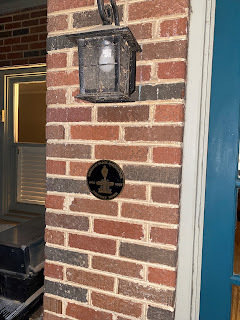 Plaque certifying that our house is a hundred years old
Plaque certifying that our house is a hundred years old
It’s been a good week. My familyhas decided, a bit belatedly, that they ate too much over the holidays. So toavoid more Keto stuff and Whole 30 meals, I have started serving what I calllight suppers, often meatless. These are the kind of meals that my mom used tofix on Sunday nights for us to dine in front of the fireplace in the livingroom. Since it’s acknowledged that I cook for some picky eaters, I approachedthis with some trepidation. A couple of nights ago I fixed Welsh Rarebit, athick cheese sauce served on toast and fancied up with pickled onions and microgreens. My mom fixed Welsh Rarebit, but as I recall it was mostly melted sharpcheddar over saltines—once when I served it for supper, Colin said, “This isdinner?” No wonder I was nervous. This time, following a recipe, I served it onEnglish muffins, and it seemed to be a hit. Christian praised the flavor of thecheese. Great! One down.
Last night supper wasscrambled eggs with a ranchero sauce and (canned) refried beans on the side.The beans were, to me, a disappointment (I want Joe T’s refritos) but theranchero sauce, heavy with chopped bacon, was another hit. Even Jacob ate withus, and Christian commandeered the leftover sauce for his eggs this morning. Mylight meals may not be exactly diet food, but I think people eat less inquantity than they do if we have a casserole or a meat-and-potatoes dish.Tonight, for a guest, I served creamed mushrooms on an English muffin (I’mreally into that muffin business) and a marinated beet and feta salad. So good,and so colorful on the plate. Once again, I blew it and should have taken apicture. A digression: Central Market sent me the biggest beet I have everseen. I ordered two, cooked the smaller one twice as long as should have,cooked the superhumongous one even longer, and I’m still not sure it’s done.The smaller one made plenty for me and my dinner guest.
This week also marked progresson my bucket lists of maintenance chores. Jacob put my compost tumbler together,but it had far too many screws left over. Christian said he’d take it in thehouse and deal with it when he had time, but he was noticeably not enthusiasticabout the chore. I called a handyman who advertises in the neighborhoodnewsletter and was recommended by a friend. He installed our brasshundred-year-plaque on the front of the house and fixed the tumbler, usingalmost all the screws. He said the instructions for the tumbler were totally inadequateand it was no wonder a highschooler didn’t get it right. So now I’m happilysaving all those vegetable scraps and making a list of other chores that need ahandyman. My walker and I have really dinged up the woodwork in the cottage,and I would like to have it touched up, repainted. whatever it needs.
It's been a great week for mein that I wrote 8,000 words on my novel-in-progress, tentatively titled, Irenein a Ghost Kitchen and fifth in my Irene in Chicago Culinary Mysteries. Ihad, as I may have said here before, put the manuscript aside at about 30,000words. I’m not sure why I abandoned it except that I was in that muddle in the middle—halfwaythrough and couldn’t see clear to the end. Ivan Doig once said writing is likedriving in the dark—you can only see as far ahead as the headlights. And myheadlights weren’t working very well. But at an informal gathering ofpublishing people someone praised Irene as a fascinating character, and thatsomehow was all I needed to hear to move ahead. So now I’m trying to write asmuch as I can. And I’m grateful to the former colleague who said that.
Big goof last night: Sophiewanted to go out at 5:30 in the morning. Somehow I set the burglar alarm off anddidn’t get it cancelled in time to satisfy the security company’s automatic system.So there I was trying to talk to this recorded voice and unable to answer Subie’scall. Finally got it solved, only to have Jordan call, ask what was going on,and say Subie was on her way over here, which made me feel guilty. Got it allsolved and went back to bed, with appropriate apologies to Jordan and Subie. Butthanks to Subie for true friendship! And to Jordan and Christian for patience.
February 6, 2024
Genesis of a short story

A couple of days ago I bloggedabout creativity, writing, and inspiration, and I included how difficult it isfor me to write a short story unless I have some sudden creative inspiration.So I thought some of you might like to read this short story, which was inspiredby a recipe. It features Kelly O’Connell, the realtor/renovator at the centerof my Kelly O’Connell Mysteries. Kelly’s office is in Fairmount, theneighborhood adjacent to mine in Fort Worth and one brimming with authenticCraftsman houses, many of which have been preserved. Long the single mother oftwo, by the time this story takes place, Kelly is married to police officerMike Shandy. Keisha who appears in the story is her office assistant.
If you don’t know the sevenKelly O’Connell books, plus a novella, you might start with Skeleton in aDead Space. The books are all available on Amazon.
A word about the short story:My son, Colin, met his bride, Lisa, when he was managing a dive resort on GrandCayman, and Lisa came there to do underwater photography. When Colin and Lisafirst returned from the Caribbean, they lived with Lisa’s parents in SugarLand, Texas. Lisa’s mother, Torhild, was born and raised in Norway and cameto this country as a soldier’s bride at the age of seventeen. She still cookssome of the dishes she knew as a child, and Colin particularly fell in lovewith these hamburgers (and I might add, with John and Torhild, as did we all).Torhild calls them Norwegian meat cakes, but we’ve all come to use the term hamburger.
I cannot tell you why thosehamburgers inspired a short story, but they did. And it is the only time I’veever incorporated the paranormal into my writing. I hope you will be charmed byAnnalise Nelsen.
Please note that this is adraft version (I seem to be unable to attach the PDF) so there are some typos. Here’sthe story of “The Villlage Gaarden.” If you want the recipe for kjottkaker, Ithink it will be the recipe of the week in Thursday’s “Gourmet on a Hot Plate”blog. Happy reading.
TheVillage Gaarden
Ashort story
ByJudy Alter
TheFairmount Neighborhood was once peppered with storefront businesses, many withresidential quarters behind them for the owners. Today most of thosepicturesque buildings have been demolished, but one or two remain, nowrenovated into charming homes.
One day,on Travis Avenue between Hawthorne and Lilac streets, I found a storefront newto me—and still open. The day showed North Central Texas winter at its worst—afreezing mix of ice and sleet, wind howling. As Mike told me that morning,“Only a fool would go out on a day like this. Stay home.” I didn’t, and now Iwas hungry for hot comfort food.
Blue-and-whitecheckered curtains hung on rods three-quarters from the top of the windows, andthe words “The Village Gaarden” were stenciled in black on the window. Iwondered about the misspelling and the owners. A hand-lettered sign indicatedthat the small café would be serving from 12:00-1:00 p.m.
Old-fashionedsleigh bells, hung on a thick leather strap and looped over the inside doorhandle, sang out as I entered. There were only six tables but they gleamed asif just waxed. Small vases held flowers that looked like lilies of the valley. Blue-and-whitechina in a variety of patterns and serving dishes rested on a plate rack aroundthe room. Steamy warm air, heavy with the wonderful smell of beef cooking, envelopedme.
Asmall woman welcomed me. Short and a little wide, she had white hair pulledinto a bun at the back of her neck and curls escaping around her face,softening the severity of her hairdo. Her face was anything but severe.Brushing her hands on her apron, she held out both hands in welcome, and I tookthem gratefully.
“I amso glad to see you,” she bubbled. “I’ve been hoping you would come. I’mAnnalise Nelsen. I love to have visitors.”
Therewere no other customers, but how could she be expecting me? I managed to thankher and then asked, “You’re only open for an hour?”
Shenodded. “It’s only me, so I only open when I feel like cooking. Today I madeNorwegian hamburgers—Kjøttkaker, wecall them. You would like? With mashed potatoes and green peas?”
Ofcourse, I would like. She bustled off, while I settled myself at a table. Itested the flowers—yes, fresh, as I thought—but lilies of the valley werecertainly not in season now. In fact, you couldn’t grow them in Texas. Withinseconds Annalise appeared with a crockery mug full of fresh, strong blackcoffee.
Iasked about the flowers. “Lilies of the valley aren’t in season now.”
“I grow,” she said. “We call them liljekonwall.”
Annaliseignored the problem of the flowers, and said, “Now, your dinner. Only oneminute. It is all ready,” and she was gone again, reappearing seconds laterwith a plate of food that looked and smelled way beyond good.
Themeat cakes, served with caramelized onion and gravy, were soft and tenderrather than chewy like a hamburger. The flavor was pure beef. I tasted thepotatoes alone first—rich with butter and whole cream. Then I dabbed a bit ofgravy on them—just as good. But the peas—they looked more like a thick greenpea soup, with dried peas that hadn’t completely lost their shape. There was noham taste. Instead, these were slightly sweet and somewhere, deep down, had abutter flavor. I savored a mouthful, while Annalise stood watching me, hands onhips.
“Youlike?”
“Ilove,” I said.
“Good.I leave you to enjoy in peace.”
Andalthough I had a thousand questions for her, she disappeared behind thecurtains again. I did eat in peace, savoring each mouthful of the hearty,soul-warming food. My feet thawed, and my disposition improved. I took out mycell phone to call Mike and tell him about the wonderful place I’d found. Icould imagine bringing the girls here and seeing Annalise hover affectionatelyover them. But my cell phone said, “No service.” I shrugged and dismissed it asdue to the weather.
Annalisecame back to ask about dessert. She had made rice pudding she told me, againsupplying the Norwegian name—risengryn.I was beyond full but then again, no one else had come in, and I was afraidshe’d be stuck with a whole lot of risen-whatever-it-was. I tried to indicateby my hands I wanted a small serving; what I got, of course, was a huge bowlthat I could not finish. Rice pudding with hints of nutmeg and vanilla andliberal amounts of currants—another thing one almost never found in Texas,unless you bought them dried.
I ateas much as I could and waited tactfully for the bill. It was well past oneo’clock, Annalise’s closing hour, and I didn’t want to detain her. Finally,calling her name softly, I headed toward those curtains. After all, she waselderly, and she might have gotten tired and nodded off. I didn’t want tostartle her.
When Igot no answer I poked my head through the curtains and found a sparkling cleankitchen—cast-iron stove, empty cast-iron skillet sitting on the top and newlyoiled, blue-and-white dishes, like those in which my meal was served, drainingin the dish rack. But no sign of Annalise and no answer to my calls.
I hadno idea what the lunch might have cost. I left a $20 bill on the table andheaded back out into the weather, but by now it didn’t seem so bad. The sleethad stopped, the sun was out, and the ice was beginning to melt. No heart forgoing back to the office and so full I was almost but not quite uncomfortable,I called Keisha in my office and said I wasn’t coming back, headed home, andtook a nap before I got the girls from school.
Atdinner that night, I picked at the hamburgers Mike had grilled. His burgerswere always great, but I was still full, and I was bursting to tell my story.As my account of lunch spilled out, almost without a pause for breath, thegirls sat wide-eyed and open-mouthed. When I finished, Maggie said, “Gosh, Mom,what an adventure,” and Em piped up with “I want to go there!”
Mikewas not so swayed. “Wait a minute, Kelly. I’ve never heard of this place andneither had you—and we both know every inch of this neighborhood pretty well.”Of course we did—I’m a real estate agent, and Mike, now a detective, was foryears the neighborhood patrol officer. “You found a place you’d never seen; itwas only open for one hour; there were fresh lilies of the valley on thetables—hey, I’m from Texas. I wouldn’t know them if I saw them. No menu, onedish. Your cell phone wouldn’t work, and the owner disappeared. Are you feelingokay, sweetheart?”
“Iknow it sounds strange, Mike, but drive over there yourself tomorrow. You’llsee it, and you should go for lunch.”
“Yeah,sure,” he said.
Ididn’t say any more about my adventure. Mike’s skepticism put a damper on it,and the girls were clearly puzzled.
****
Mikecalled before ten o’clock the next morning. “Kelly, I just drove the length ofTravis Avenue, and I didn’t see any storefront buildings, let alone The VillageGaarden” His voice dropped. “I don’t know what to tell you, except, sweetheart,have you thought maybe it was a dream when you had that good nap before thegirls got out of school?”
“Didyou tell any of your buddies at the police station about this?” My question washostile”
“Swear,”he said. “You tell Keisha?”
“No,”and he knew it was serious, because I tell Keisha, my office assistant, almosteverything. Had I imagined that? No, Imost definitely had not! How would I have known about kjøttkaker andliljekonwallL?
Imuttered, “I’ll be back” and slammed out of the office. But it wasn’t on TravisAvenue. I drove nearby streets, weavingin and out of some that were only a block or two long. I saw two abandonedstore fronts but no Village Gaarden.
Backat the office, I sat in a slump until Keisha whirled around and demanded,“Okay. What’s the problem?” Keisha is young, African American, colorful, andthe most amazing person I’ve ever met—maybe beside Mike. Among other things,there’s her sixth sense.
I toldher the whole story and waited for the laughter, but it didn’t come.
“Okay,”she repeated. “We got to get to the bottom of this. I can’t have you in this funk all the time.Worse than when you and Mike have an argument. Who’s the oldest person you knowin Fairmount?”
“Mrs.Workman,” I answered without hesitation. “She’s in her nineties, and she’slived here since she was a young bride. Still lives in the same house onJessamine.”
“Let’sgo see her.”
“Yougoing too?”
“Yep,I am. I gotta get to the bottom of this too. Your mama’s cooking is prettygood, but I could eat some of that Norwegian stuff you’re talking about.”Keisha lived with my mom off and on when there seemed to be a reason.
Icalled Mrs. Workman and asked if Keisha and I could come for a visit.
“Ofcourse, Kelly, dear. But you know I’m not going to sell my house.” No quavermarked that elderly voice. It was as strong and forthright as mine.
“Oh, Iknow, Mrs. Workman. I just want to ask about, uh, some neighborhood history.”
“Oh,my dear, I love to talk about that. You and your friend come right over. I’llput the tea kettle on.”
ThelmaWorkman used a cane when she came to answer the front door, but her handshakewas firm, and she welcomed Keisha as heartily as she did me. Clearly, she hadworked quickly, for the tea tray sat on the coffee table complete with teapot,creamer and sugar, three cups, and a plate of sliced homemade banana bread.
Please, Lord, let me be like this when I’mninety!
Wechatted casually about the bad weather, the changing neighborhood, Mrs.Workman’s Persian cat. All the while, Keisha fidgeted.
“Mrs.Workman,” I began hesitantly, “do you remember a small restaurant called TheVillage Gaarden?”
Hereyes were bright, and she was instantly on the alert. “Over on Travis Avenue? Iremember it well, because I enjoyed many good meals there. Annalise Nelsencould cook like no one else I ever met. She surely put me in the shadows.”
I alsoshot Keisha a look that said, “See? I didn’t make this up.”
Mrs.Workman continued. “That was years ago, though. In the ’40s, if I remembercorrectly. I was a young bride, and I even went there for help with cooking.She was so generous and loving—like a second mother to me. But then Annalise’shusband died, and she went back to Norway.”
“Shewent back to Norway?” I echoed. “What happened to her restaurant?”
“Herchildren sold the building, and it was demolished. Isn’t there a playground onthe site now?”
I hadseen a playground when I went back looking for the restaurant. I turned toKeisha, helplessly, but she didn’t laugh nor did she frown. She just reachedout for my hand and held it comfortingly.
Mrs.Workman persisted. “How did you even hear about that tiny restaurant, Kelly?”
“Oh, Iwas examining some old maps, and it was listed on one.” I was surprised that Icould lie so easily and quickly.
Wechatted a bit more, thanked that lovely lady for tea and delicious bananabread, and left. In the car, Keisha sighed. “I sure wish that hadn’t been adream, Kelly. Those Norwegian hamburgers, whatever you call them, soundwonderful.”
“Theywere,” I said. “I have the recipe in my purse. Annalise gave it to me. Want tocopy it?”
Iwasn’t telling Mike about that. Someday I’d make kjottkaker for him and claim I’d found the recipe on line, afterthat dream I’d had. But Annalise was real.
February 5, 2024
A topsy turvy day
 My UCLA granddaughter many years ago.
My UCLA granddaughter many years ago.
Truly we have had an upside-downday today. I thought I would report that Cricket, the Burtons fifteen-year-oldCavalier Spaniel, had been helped over the rainbow bridge. Jordan and Christianwent to the vet for what sounded like a final decision and last visit, butJordan insisted she wanted to see Cricket out of the oxygen tent and in an examroom. So they spent an hour watching Cricket walk in circles (she does that allthe time), asking to be loved, not coughing, seeming fine. The vet shrugged andsaid, “Take her home.” So she’s home tonight, and the Burtons are keeping vigilover her. Jordan is exhausted, and even I am tired after being keyed up for theinevitable which turned out not to be after all.
There was sad news todaythough. I got word that an author who befriended me early in my career, becamea good friend as well as a mentor, has died in Arizona. Jeanne Williams,prolific author of over eighty books under a variety of names, was a prominentand active member of Western Writers of America when I joined in the 1970s.Although I knew her principally as the author of historicals set in theAmerican West, she also wrote fiction set in the United Kingdom. As forwesterns, she was a pioneer in making women center in western fiction. She servedas president of WWA, was an activist for animal rights, and a member of thesurvival team in her Chiricahua Mountain town of Portal, Arizona. Jeannestopped actively publishing some ten or fifteen years ago but her books remainon sale from Amazon and other outlets. In a sad way, her passing reminds me howfleeting literary fame can be. She deserved more recognition than she got. Ihad not been much in touch with her in recent years—her letters had becomeinfrequent and sometimes confusing. A widow, she had lost both her grownchildren tragically, and I was glad to hear that she was surrounded by lovewhen she passed peacefully. Perhaps her best known title is Harvest of Fury, part of her post-Civil War trilogy set in Arizona.
For me, today was also an upside-downday in the world of taking care of business. For some time, I have been tryingto figure out dental insurance. Until two years ago, TCU provided such forretirees; when that stopped, I took out a totally inadequate policy from acompany I was told was respectable. I suffered through the first year whenpolicies often pay little, but in the second year I expected better: they paid$73 on a $521 bill. Combine that with what I paid in monthly fees, and I wasclearly upside down. But the world of insurance is a bewildering place for thelay person, and I was lost. Colin sent me a list of policies recommended for seniors.First on the list was a company underwritten by the very company I’d hadtrouble with—no, thanks. But second was Humana, and I have had Humana Medicaresince I retired, so I called them. Turns out I have had dental insurance undermy general health policy for years. Problem solved so easily I can hardlybelieve it! Then in an ironic PS I read today in the retirees' newsletter that TCUis about to offer a policy for retirees. When it rains, it pours.
But there’s a downside to myfinancial day: turns out that when I paid for the tree trimming, I only paidpart of the bill, and I still owe a goodly amount for tree removal.
And in puzzling news, someonehas twice charged Door Dash deliveries of shakes to my debit card. So I had tocancel the card, and the bank will credit my account and issue a new card. Buthow in the world did someone get my card number, especially since I rarely useit. I guess I’m lucky whoever used it wasn’t more extravagant.
I’m ready for an early bedtimeafter the “excitements” of today. Another bonus: It was a beautiful, sunny dayin Texas, although a bit chilly. And my granddaughter at UCLA reports she issafe and dry. I’m feeling blessed.
February 4, 2024
Getting back into my groove

Creativity is a funny thing. Somethink it’s some sort of spontaneous will o’ the wisp kind of thing, and I’minclined to agree, at least in part. I certainly don’t believe creativity isalways “turned on” at the same level in an individual. Take short stories forinstance—I cannot write one to save my life unless inspiration hits, Once whenasked to contribute a short story to an anthology about World War II, Idithered forever about what to write. And then, an idea came out of the blue—I clearlyheard an old woman’s voice lamenting her children lost to war. I wrote thefirst draft in about two hours and called it, “A widow’s lament.” The same issort of true for novels—an idea has to “hit” me. I’m sure what really happensis that an idea simmers in the back of my brain and then bursts forth in myconsciousness.
I thought for instance that Iwas through writing about my diva faux French chef, Irene Foxglove. But then anidea struck me—as I’ve been telling it, Irene tapped me on the shoulder andsaid, “Ahem, we’re not through with my story yet. I have to tell about thefamily I’ve left behind.” My fried Fred, who advises me, says if I ever amreally through with Irene, I’ll have to drive a spike through her heart.Meantime, she’s given me the idea for a new story. That doesn’t mean writing ithas gone smoothly. There’s that thing called writer’s block.
Writer’s block is an evenfunnier thing than creativity, though not in an amusing way. The dictionarytells us writer’s block is a state of being unable to think of what to write orhow to proceed with writing. It happens to me, predictably, somewhere between 20Kand 40K words. I write short—I know writers whose first draft of a mystery runsup to 90K to 100K but mine are often 55K at best. A good traditional or cozymystery should be about 70K.
When I get to that middlepoint, my sticking point, my instinctive thought is “There’s so much more togo! How will I ever fill those pages? I’m ready to wrap this up now.” HankPhillippi Ryan, an author much more talented and prolific than I am, calls thatpoint, “The muddle in the middle.” I have been known to shelve a manuscript at 20Kwords, go back months later, and think, “Hey, this isn’t so bad!” That hashappened with at least two books in the Irene series. And it happened with thecurrent one which I’m calling, Irene in a Ghost Kitchen.
We are told in writers’ groupsthat persistence is the basis for success as a writer. Classic advice: put yourbutt in the chair and keep it there. I guess that’s where I failed. I put thismanuscript aside at 32K words and focused on my cookbook. Then a friend, whoseliterary knowledge I respect, commented on what a good character Irene is, andI thought, “Hmmm. Maybe I should go back and re-read that.” I did, and suddenlymy head is teeming with ideas. Whereas before I had no idea how it would workout, now I can see the ending. I’m just impatient to get it all down on paper.
Last night, Sophie and I didn’tsleep well, partly because one or the other of us had to pee. But I also layawake for great bunches of time writing in my mind. I’m not one of those whogets up in the middle of the night to make notes, so I am trusting that some—most?—ofthat night-time activity is tucked away in my subconscious and will surfacewhen needed.
Excuse me. I’ve got to go now,because I left Irene in a precarious situation. But PS I am delighted thatpeople find Irene funny, interesting, complex, all those things. I call heroutrageous. But I hope the narrative voice, which belongs to a much youngerchef Henny James, is as riveting with her wry sense of humor and her clear understandingof Irene—well, almost.
Want to start the series? Try SavingIrene. Amazon.com:Saving Irene: A Culinary Mystery (An Irene in Chicago Culinary Mystery) eBook :Alter, Judy: Kindle Store
February 3, 2024
A food craving satisfied and memories of rodeo days
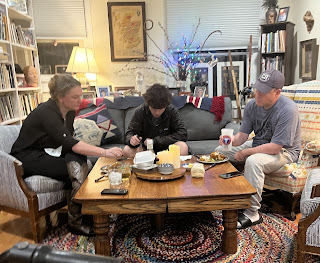 Eating fried chicken in the cottage
Eating fried chicken in the cottageFor some time, I’ve beencraving fried chicken, so tonight we ordered dinner for four from Bonnell’sCurbside meals. During quarantine, when restaurants saw their business diminishand disappear, Fort Worth’s Jon Bonnell found a way to keep his Bonnell’s FineCuisine active. He packaged curbside meals for four, priced them reasonably,and sold them literally on the curb by his restaurant each afternoon, Tuesday throughSaturday. They were so successful, he has continued the tradition to this day. Wehave had them a few times—mostly the Beef Stroganoff. Several of the entreesare pasta which isn’t popular here, usually one is shrimp which I can’t eat,and one is smoked chicken and pulled brisket which doesn’t appeal. TheStroganoff though is delicious, and I still want to try the meat loaf. Tonight’schicken came with mashed potatoes, gravy, green beans, salad, and brownies. Andthe amount is generous. So craving satisfied.
Jacob almost never ever eats Saturdaynight dinner with us. This afternoon when I asked if he was joining us, hesaid, “Probably not. It’s Saturday night, you know.” I replied, “Sometimes inlife you have to make choices. We’re having fried chicken.” He said with a grinhe’d have to think about that. Somewhat to my surprise, he showed up forsupper.
So now I’m full and happy—and waitinguntil I’m hungry enough to eat the remaining brownie.
We never had fried chicken inmy home when I was growing up, which may account for my fascination with itnow. I honestly don’t know if my mom ever tried to fry a chicken. (She didteach me early on how to cut up a chicken, something the girls in my familyrefuse to do—Jordan in particular won’t touch raw poultry, and for some yearsmy function at Thanksgiving and Christmas was to prepare the turkey forroasting. They’ve gotten better now about it.) Not only did Mom not want to fryin all that oil, Dad, the proper Englishman, did not tolerate picking up food inour hands. A sandwich at lunch at the kitchen table was okay but never at the dinnertable (we ate with linen tablecloth and napkins every night and no passed food—Dadserved the plates as the head of the household; no, we were not rich, justshaped by his Canadian/British background). I have never myself tried to frychicken, and I find “oven fried” a poor substitute. But tonight I was thinkingthat what attracts me as much as anything is the slightly peppery seasoning ofthe coating. I think that’s a southern thing.
Tonight may have been friedchicken night at the cottage, but it is the last night of the Southwestern Expositionand Stock Show, lovingly known in Fort Worth as the stock show and in the pastas the “Fat Stock Show.” The powers that be dropped the “Fat” some years ago. Tonight,the owner of the champion steer, a high school girl, is $340,000 richer—I’m nojudge but her snow-white steer is one of the most beautiful steers I’ve everseen. I think a conglomerate usually buys the winner, so it is spared from theslaughterhouse, and the owner is spared that dilemma between emotion and profit.
Rodeo always makes menostalgic. When my children were little, going to the rodeo was a rite ofpassage. Each had to wait until they were judged old enough, and then it wasone of the highlights of the year. We routinely went with another family forseveral years and dined on the ribs and sausage offered by Coburn’s Catering, alongtime culinary institution. That family moved away, but then we developed atradition of all the Alters coming for rodeo—the performance on Friday night,prowling the grounds, especially the Midway Saturday afternoon, and dinner at JoeT.’s Saturday night. It was an annual reunion that I truly looked forward to.Gradually the tradition fell apart—with kids in school, it was hard forfamilies ot get away and parents had other demands. Now, some years Megan comeswith a friend, but she didn’t even do that this year. Jordan and Christian havegone several times, with friends, and Jacob has gone at least once. My rodeodays are long over, not just because the arena is not accessible for me butbecause I’ve joined the ranks of those who don’t want to see the brutality ofrodeo, especially the bull riding. Having written a bit about rodeo, I knowthey take every precaution for man and beast, but it can still be brutal. I don’twant to see anyone or any animal hurt. But it sure does provide some greatmemories. Grands at the rodeo, back in the day
Grands at the rodeo, back in the day



